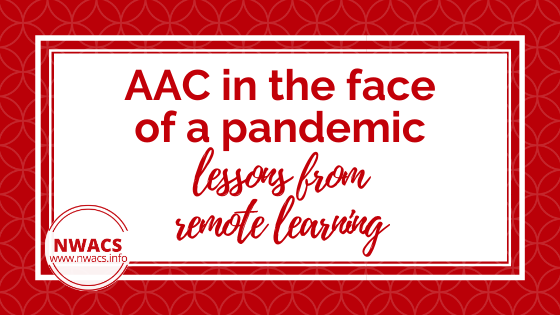by Sara Jerger, MS, CCC-SLP (Speech-Language Pathologist); NWACS Contributor
Back in July I wrote my first blog post for NWACS. The topic of that essay was how we managed to provide services to students who use AAC during the spring COVID-related school facilities closures and racial justice uprising. I knew I would be writing again in September, and I assumed I would be covering the re-entry into school - how to catch up with students, how the relationships and communication with families that we forged in the spring had been carried over as a component of my practice, how anti-racism is something we are talking about explicitly and embedding into our practice.
Instead, it seems as though we are living through Groundhog’s Day where one day runs into the next. But if I take a closer look, I can see that things aren’t really the same as they were in the spring. Our services are more robust. At the very least, the communication that was forged between providers and families in the spring is indeed making things easier this fall, and while I can’t say that we have moved into an era of anti-racism curriculum, we are at least having conversations about equity.
I am approaching a return to services this fall with rigor, humor, and flexibility. I have started with my usual core word lessons based on Zangari’s Tell Me curriculum and, honestly, in some ways I think they are more engaging than usual because each student has an individual screen to see the animations and hear the sound effects up close and personal. I push into student “classrooms” (i.e. Zoom meetings) and the benefit is that I am modeling for both school staff and families. I have never had that kind of opportunity before and I see it as a huge benefit to working under pandemic conditions.
In addition to live lessons, I am posting asynchronous (recorded) videos for families who can’t access live instruction or who want repetition. Access is a huge issue with remote learning, especially for our students with disabilities. Asynchronous learning is one way to address that.
When in the building, I would have a whole packet of things to put on classroom walls, hallway walls, and information for staff about the next group of focus words. Since we are not in the building, I am sending out a parent information packet. I am glad that I have this opportunity to work with families so closely. It is forcing me to increase my family communication and communicate with families in a way that I probably should have been doing all along.
Additionally, my district has an AAC Task Force of which I am a member, and we are hosting monthly AAC office hours. These will have a short presentation covering the basics of AAC (why does my student need AAC, modeling, core words, etc.) as well as a Q and A format. NWACS board member Margaret Edwards is spearheading these efforts, and I am grateful for her leadership.
We know that students with disabilities are members of the distinguished category “those furthest from educational justice”. The spring closure exposed existing inequities in our students’ lives, and the Black Lives Matter movement is forcing a social reckoning for our country (finally). What I find missing from the conversation is a discussion on the intersection of disability and race. We know Black and Brown students are disproportionately identified as having a disability. What are we doing about it? What opportunities does the pandemic offer?
I am pushing myself to think about how we uphold justice and maintain safety. I have many questions and very few answers. How do we keep our students with complex needs engaged AND safe? How do we respect the health of staff who serve these students? How do we foster anti-racist practices and acknowledge the intersection of disability and race in our work? What do our families need to feel like school is a community that respects their needs and cultures?
The pandemic offers an opportunity to re-think our practices and make fundamental changes in the systems they uphold. It’s time to work as a community to offer strategies for change and answers to these questions. What practices are you changing or starting to ensure your students are receiving safe, just, and engaging services during this period of remote learning? How can we ensure those practices are maintained when buildings are re-opened?
Comment below to join the conversation.
Related:



